Presidents 34-36
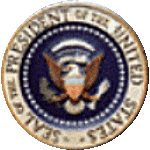

Dwight D. Eisenhower
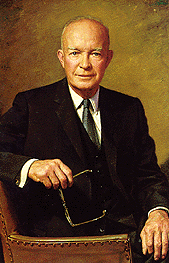
"I like Ike" was the winning slogan of presidential candidate Dwight
Eisenhower. And "Ike" Eisenhower was one of the most trusted and
respected Presidents of the twentieth century. Eisenhower was not an energetic
innovator like Theodore or Franklin Roosevelt. He was a fatherly President who
presided over a period of relative stability and prosperity.
Dwight David Eisenhower was born in Denison, Texas, but grew up in Abilene,
Kansas. He went to West Point Military Academy to get a free college
education, but was actually more interested in football than academics. During
World War I, Eisenhower entered the army and requested overseas duty. He was
disappointed to be assigned a job as training instructor instead. In the
1920s, he attended the Army's Command and General Staff School and the Army
War College. Eisenhower rose steadily through the ranks in the 1930s, and for
years he served on the staff of General Douglas MacArthur.
The Second World War was Eisenhower's opportunity to show his leadership
ability. At first he was assigned to develop war plans in Washington, D.C. But
he did such a good job that in June, 1942, Eisenhower was given command of
American forces in Europe. Under his command, Allied armies mounted successful
invasions of North Africa, Sicily, Italy, and France. General Eisenhower
demonstrated diplomatic and political skills in negotiating the conflicting
demands of generals and politicians of the Allied nations. Under his command,
Allied armies achieved victory in Europe on May 7, 1945.
The Republicans nominated Eisenhower as their presidential candidate in 1952.
The popular war hero defeated Democrat Adlai Stevenson by a landslide.
Eisenhower proved to be a dependable, middle-of-the-road President. He brought
the Korean War to a conclusion in 1953; North and South Korea remained divided
at the 38th parallel. Eisenhower easily won reelection in 1956, once again
defeating Democratic candidate Adlai Stevenson. In 1957, he gave weight to the
Supreme Court's decision in Brown v. Board of Education of Topeka (1954) that
segregated schools were unconstitutional. Eisenhower sent federal troops to
enforce integration at an Arkansas high school. The growing movement for
integration in all areas was one of the most notable features of Eisenhower's
second term.
Throughout his presidency, the Cold War continued. Eisenhower did eventually
condemn Senator Joseph McCarthy for his communist "witch hunts," and
he did entertain Soviet leader Nikita Khruschev at the White House. But
tensions between the United States and the Soviets were still high when he
left office.
In some ways, the Eisenhower years were most notable for what they lacked: a
major war, severe economic problems, or vast social unrest. The President with
the winning smile and moderate views seemed to symbolize the strong and steady
United States of the postwar years.
After his second term, Eisenhower retired to a farm near Gettysburg,
Pennsylvania and wrote his memoirs. He died on March 28, 1969.
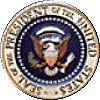
John F. Kennedy
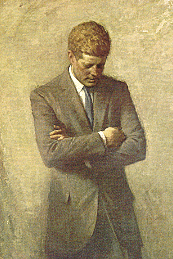
Most Americans who were alive in November 1963 can remember where they were
when they heard the news that President Kennedy had been assassinated.
Kennedy's murder was especially shocking because he embodied the hopes of
young people. Kennedy had said in his inauguration speech that "the torch
has been passed to a new generation of Americans." But sadly, Kennedy was
not allowed to run with the torch for very long.
John Fitzgerald Kennedy was born into a wealthy Irish Catholic family in
Brookline, Massachusetts. His ambitious father, Joseph Kennedy, wanted one of
his sons to become a politician. When his oldest son was killed in World War
II, the next oldest, John, was marked for the political role.
Kennedy took his degree in political science at Harvard University. Then,
shortly before America entered World War II, he joined the navy. Joseph
Kennedy used his influence to get John the command of a PT (patrol torpedo)
boat. On August 2, 1943, the PT-109 was rammed by a Japanese destroyer and cut
in two. Kennedy towed an injured crew member for four hours until they safely
reached an island. But the ordeal worsened a chronic back problem, and he was
discharged in early 1945.
After the war, at the age of 29, Kennedy became a member of Congress for
Massachusetts. He was reelected twice, and then elected to the Senate in 1952.
That September he also married Jacqueline Bouvier. John and Jacqueline had
three children: Caroline, John Jr., and a second son who died in infancy.
In 1960, Kennedy won the Democratic nomination for President. Both Kennedy and
his opponent, Republican Richard Nixon, campaigned with great energy. In the
first presidential debates to be aired on television, Kennedy charmed viewers
with his good looks and wit. He won the election by a narrow margin.
Kennedy's first term did not get off to a good start. In April, 1961 the
United States Central Intelligence Agency landed an army of 1,500 Cuban exiles
in Cuba in an attempt to overthrow the communist Castro government. This Bay
of Pigs Invasion turned into a disaster that embarrassed the President and the
nation.
In October, 1962, Kennedy learned that the Soviet Union was building missile
bases in Cuba. In an attempt to keep the Soviets from installing nuclear
missiles on the bases, he ordered a "quarantine" of the island. The
American navy threatened to stop any Soviet ship that carried missiles to
Cuba. Although it seemed as if the world teetered on the edge of a nuclear
war, the Soviet Union eventually turned its ships away from Cuba. The Cuban
Missile Crisis demonstrated that Kennedy could act decisively and
intelligently under pressure.
Kennedy was president when Communist East Germany decided to build a wall
across their city to cut off East Berliners from freedom in the West. In a
powerful symbolic gesture, Kennedy went to the city to show support for all
Berliners.
In domestic affairs, Kennedy proposed legislation to increase civil rights and
fight poverty, but Congress refused to pass most of it. Congress did approve
funding for the space program that would ultimately fulfill Kennedy's goal of
putting an American on the moon.
Kennedy never lived to see that day. On November 22, 1963, while riding in a
motorcade in Dallas, Texas, he was shot by Lee Harvey Oswald.
A grieving nation soon idealized its martyred President. Some people called
the Kennedy years "Camelot," after the legendary city of King
Arthur. Today, he remains in the memory of those old enough to remember him as
one of our most magnetic Presidents.

Lyndon B. Johnson
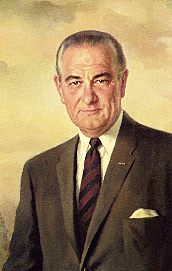
Lyndon Johnson said that "Unfortunately, many Americans live on the
outskirts of hope, some because of their poverty, and some because of their
color, and all too often because of both. Our task is to help replace their
despair with unconditional war on poverty in America." In his attempt to
propose war on poverty and racism, Johnson orchestrated the passage of more
sweeping progressive legislation than any President since Franklin Roosevelt.
And yet, by the end of his first term, he had become so unpopular with the
American people that he decided not to seek reelection.
Lyndon Baines Johnson was born near Johnson City, Texas, on August 27, 1908.
His father and grandfather were state representatives, and as a child he
attended sessions of the state legislature. Johnson won a seat in Congress in
1937 as a New Deal Democrat. He was reelected six times.
After the attack on Pearl Harbor, Johnson became the first member of Congress
to go on active duty in the armed forces. He won a Silver Star when his plane
was attacked by the Japanese over New Guinea. When President Roosevelt asked
that members of Congress return to Washington, Johnson resigned his commission
and returned to Congress.
Johnson moved to the Senate in 1948. In 1953 he became minority leader. When
the Democrats won control of the Senate in 1955, he became the youngest
majority leader in the history of the Senate. Johnson was one of the most
powerful and effective leaders in congressional history. He knew how to use
the levers of power as few other people did. He used committee appointments
and office assignments to win support for legislation. But above all, he was a
master at influencing people by the sheer force of his personality.
Presidential candidate John Kennedy chose Johnson as his running mate in 1959.
Kennedy and Johnson beat Richard Nixon and Henry Cabot Lodge by a tiny margin.
Johnson hated being Vice President. He had little of the power he had had in
the Senate, and he did not get along with the young eastern liberals who made
up Kennedy's Cabinet and staff.
On November 22, 1963, Johnson watched as Kennedy, riding two cars in front of
him, was shot by an assassin. Later that day, Johnson was sworn in as
President. Congress, which had been reluctant to pass many of Kennedy's
proposals, behaved differently when Johnson became President. Johnson used all
his political skills to pass his "Great Society" programs. Medicare
and Medicaid were established to help the elderly and the poor pay for medical
treatment. The Civil Rights Acts of 1964 and 1968, and the Voting Rights Act
of 1965 helped to protect the rights of African Americans and other
minorities. Many of the programs Johnson established continue to help
Americans today. But the cost of paying for the Great Society and the Vietnam
War created a national debt that sapped the strength of the economy for years.
Johnson ran for reelection against Republican Barry Goldwater in 1964. Johnson
successfully painted Goldwater as a right-wing extremist, and Johnson won the
election by a landslide.
Johnson's second term was increasingly dominated by the Vietnam War. The war
between North and South Vietnam had been raging for years, but Johnson was the
first president to send large numbers of troops to try to defeat the communist
north. The President found he was unable to win the war or negotiate peace. As
American casualties escalated so did the protests against the war. When
Johnson realized how unpopular his Vietnam policy had made him, he decided not
to seek reelection in 1968.
Johnson retired to his Texas ranch and wrote his memoirs. He died of a heart
attack on January 22, 1973.

All images of Presidents are courtesy of whitehouse.gov
Information taken from Software titled "American Heritage The History of
the United States for Young People.
The copyright belongs to: Forbes
Inc. and Byron Preiss Multimedia Company. Thank You!



|